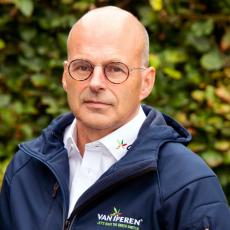What is the background story that turned Van Iperen into the international company that it is today?
Van Iperen Group has a century-old experience in supplying fertilizers and seeds across the Netherlands. As of 2010, we decided to leverage this legacy and make our products known to the wide world, thus achieving an international presence in over 100 countries. The Middle East and North Africa are known to be open to European expertise and products, so they have become our core markets. Our initial ambition was to challenge the large multinational companies that were ruling the market by creating a customer-centric global distribution platform. From the early beginning, we have been focusing on the development of specialty fertilizers and later on, we added biostimulants to our pipeline.
What benefits can specialty fertilizers bring to the agriculture space?
Before World War 2, traditional mineral fertilizers were the only known option to boost food production. This changed with the inception of specialty solutions, like water-soluble fertilizers used in drip irrigations or foliar applications, and we really see further agricultural benefits from these. Such solutions allow for a more precise application, thus reducing leaching and evaporation. Having a much higher uptake efficiency, we can say that shifting towards specialty fertilizers was in itself a first step towards sustainability.
Biostimulants are a newer addition to your portfolio. Can they act as a bridge between fertilizers and crop protection, leading us towards a holistic approach to plant health?
Biostimulants (like seaweed extracts) have been around for a few decades now but, only recently, have scientists started to unveil and test their beneficial effects on the metabolism of plants. In a nutshell, their purpose is to help crops overcome certain stress conditions like extreme drought or soils with a high pH. Last year we introduced a plant based biostimulant solution, which we developed together with Landlab in Italy. This product, called Plants for Plants, is a series of cultivated-plant-based formulations that we apply on crops to transfer the specific traits identified in the original plant such as drought resistance or better nutrient use efficiency. Even in very fertile conditions, crops always have certain periods of stress and boosting their metabolism could improve the yield and quality. Biostimulants help farmers to cope with the effect of climate change and unpredictable weather conditions on their crops.
The EU Life Program has backed our development for this new generation of biostimulants with subsidies as they are interested in finding proven ways to help farmers use less water and grow more resilient crops. Due to environmental concerns and regulations, chemical pesticides are to be reduced and the focus is going to be on growing stronger plants that have better nutrition and can withstand difficult conditions. While synthetic fertilizers are efficient in securing the agricultural output, innovative sustainable alternatives will slowly replace them. Case in point: even important agrochemical companies like Syngenta or Bayer are now investing serious portions of their capital in biostimulant solutions. As time goes by and we advance in technology, the boundary between crop nutrition and crop protection will probably dissolve and we will step into the zone of holistic agricultural solutions. The EU LIFE program has recognized this potential and even nominated Plants-for-Plants as “LIFE project of the year”.
The war in Ukraine disrupted many aspects of the agricultural industry. How has Van Iperen experienced this shift?
The traditional fertilizers sector definitely suffered a big impact due to the leading role Russia has on the supply of many commodity fertilizers. Since we are exclusively dedicated to specialty fertilizers, we have not seen any issues in this sense but we are affected by the increasing costs of energy - an issue that has a trickledown effect on the price of nitrogen. Thanks to its strong agriculture sector, Ukraine could have been a potential market for our products, but with the war raging on, there is no clear opportunity right now.
What are the key objectives that you would like to see Van Iperen achieve over the next few years?
Climate change is definitely top in our minds, especially since we are a part of the industry that has a responsibility for the effects that we see today. Change will not happen overnight but, with all the amazing technology and passionate people that drive it, we are sure to see improvements in the future.

Agriculture is still a fairly conservative space and many innovative start-ups are having trouble marketing their products. Our mission is to help them commercialize their breakthrough findings.
Two projects are worthwhile mentioning. In 2021 we have launched the first sustainable nitrate fertilizer at industrial scale and opened the first factory in its kind in Hardenberg (the Netherlands). Our partner in this project is Pure Green Agriculture, an American R&D company, who developed the patented production process to produce a pure liquid nitrate fertilizer from manure. The concept has been granted two prestigious horticultural innovation awards and is today used in high-tech greenhouses by growers eager to decrease their carbon footprint.
The second project is about producing a fully water-soluble potassium sulphate from a waste stream produced by Northvolt, that we are going to launch early 2024. Northvolt is a gigafactory producing batteries for electrical cars of the German carmakers. This project is developed by Swedish Cinis Fertilizer, a startup listed at Nasdaq Nordic. This technology will have close to zero carbon footprint which is a dramatic improvement compared to the current producers that use technologies from early last century.
These projects show the ability of high-tech agriculture to address both sustainability issues and the growing demand for food. Our ultimate goal is to be at the forefront of the decarbonization of agriculture.






